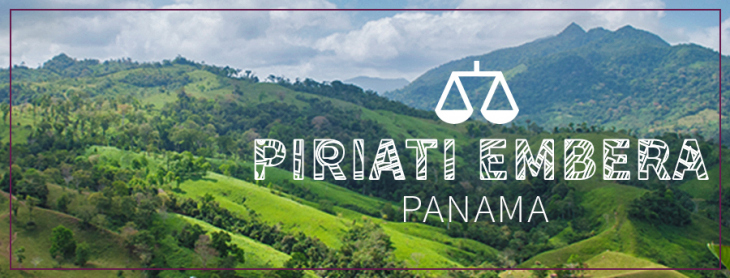About Piriati Embera
|
Project Overview |
|
| Volunteers | 27 |
| Cases Taken |
3 |
| Cases Resolved |
0 |
| Cases Being Processed | 3 |
| Hours of Legal Clinics | 5.5 |
| # of legal consults | 18 |
| Hours of Education | 2.5 |
Piriati Emberá is an indigenous Emberá community of about 165 homes
and 780 inhabitants. It is located in the district of Tortí along the Pan
American highway in East Panama. Piriati Emberá is a farming
and artisan community. Families produce crops like rice, plantains, yucca,
and corn for their own consumption as well as to sell to intermediaries.
Many women and some men sell traditional artisan crafts as well. As one
of Global Brigades Panama’s holistic communities, medical/dental brigades
conduct mobile clinics, business brigades is working to create a community
bank, and Environmental brigades have built a greenhouse structure and
are working to complete a reforestation project.
Initially, the Human Rights program did not work within indigenous communites
because the internal laws and structure existng within indigenous territories
provides a certain level of legal autonomy, complicatng some aspects of
Panamanian law. Indigenous communites deal with many legal issues
internally, such as cases regarding petty theft and alimony, where they apply
punishment as they see fit. For more serious cases such as visitaton rights
and divorce, they appeal to legal authorites outside of the community’s legal
structure.
| Additional Information |
| General Community Profile |
| Pre-Brigade Lesson Plan |
| On-Brigade Lesson Plan |
| Legal Cases |
In March 2014, the Human Rights team decided to present GB’s Human
Rights program to the leaders of Piriati Embera. After multiple meetings, all
parties concluded that the program would be useful for certain processes that
the community does not have the capacity to resolve internally. As a result,
the Human Rights program is now able to resolve cases in indigenous
communites as long as each case and process is approved by the community
leader (Noko or Casique) and does not interfere with indigenous customs, as
well as provide legal clinics with the assistance of indigenous and
Panamanian lawyers.
Piriati Embera's Barriers to Justice
Legal services are difficult to access in rural eastern Panama for two primary reasons: location and cost. Most often, there are no legal services set up within rural communities and are instead
concentrated in urban areas. Therefore, rural Panamanians must travel multiple hours to access these services. Not only does traveling to these urban areas cost money, but the legal services themselves are frequently too expensive.
In addition, there is an attitude of mistrust amongst the rural clients. Historically, there have occurred many cases in which lawyers have come to rural communities, the community members have paid for the legal services, but the lawyers have returned to the city without resolving the cases. Therefore, it is a challenge to gain trust of the community members when it comes to dealing with their personal human rights issues, and to prove not all lawyers will take advantage of them.
Civic Engagement and Empowerment
By focusing on specific aspects of legal access and inclusion, Global Brigades’ Human Rights Program aims to empower communities like Piriati Embera to overcome the obstacles mentioned above. Starting in March 2014, Brigaders have been able to expand Human Rights brigades to indigenous communities, enabling them to tackle family law cases, execute pro-bono legal clinics, and perform educational workshops.
Family Law: The most common legal issues within the community include issues of alimony and childcare, land issues, domestic violence, and some violent crimes. Without a lawyer in the community, many legal issues go unresolved or unattended for many years, and seemingly simply legal troubles can go unanswered. Volunteers, in conjunction with Panamanian lawyers, have been able to take on 3 family law cases to date.
Legal Clinics: Global Brigade’s Human Rights Program has been able to offer their pro-bono legal services to community members in Piriati Embera with the help of Panamanian lawyers as they are shadowed by volunteers. Both community members and volunteers work together to challenge the stigma of lawyers in the region by offering real, professional services for free.
Educational Workshops: Capitalizing on the use of education as a tool for community empowerment, volunteers lead discussions and workshops with students and families about issues that have direct consequences and effects in their everyday lives, including: the right to education, child abuse, drug use, and child labor laws.
View Legal Cases for Piriati Embera
| Human Rights Brigades Chapters that Worked in Pirati Embera |
||
| Human Rights Brigades Chapter | Month | Volunteers |
| Dublin City University | March 2014 | 8 |
| DePaul University, UCLA, and UC Irvine | June 2014 | 19 |
Visit Other Programs in Piriati Embera
Global Brigades strives to implement a model of Holistic Development in communities through a system of collectively implementing health, economic, and education initiatives to strategically meet a community's development goals. Learn more about the other programs being implemented in Piriati Embera:
![]() Business
Business![]() Dental
Dental ![]() Environmental
Environmental ![]() Medical
Medical ![]() Microfinance
Microfinance ![]() Public Health
Public Health
